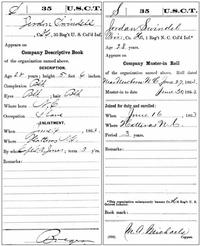When I was growing up, Black History Month meant learning about Harriet Tubman, Frederick Douglass, Martin Luther King, Jr., and other historical figures whose life’s work was crucial to my privileges of freedom and an education. But what I couldn’t discover in those classrooms was my own family’s history and my ancestors’ unsung tenacity and resolve: my parents, who attended segregated Southern schools with far fewer resources than I had; my grandparents, who raised their families amid racist Jim Crow laws; and their parents before them, the sons and daughters of enslaved men and women.
Most of what I know beyond my grandparents’ generations are only names, pulled from census reports of the 1870s and after. My frustration with this bare-bones knowledge is shared by so many other African Americans. I was reminded of this when I attended two recent events that were part of the 2016 One Book, One Philadelphia season: a book discussion of Twelve Years a Slave at the Johnson House Historic Site this past Friday, and a presentation on The Diaries of a Free Black Woman in Philadelphia at Oak Lane Library on Monday night.
At the Johnson House, discussion of the book led a participant to share a family story of his enslaved grandfather, who lived in Jamaica as a boy. One day he boarded a ship, thinking he’d be taking a short trip. The child waved goodbye to his mother from the boat deck. What he didn’t know was that he had been sold to an owner in the United States, and that he’d never see his mother again.
At Oak Lane, Dr. Judith Giesberg of Villanova University discussed the writings of Emilie Davis, a free black Philadelphia woman who kept a series of pocket diaries in the 1860s. This kind of documentation is rare—there are only a handful of extant diaries by African Americans before the 1900s. From her first-person accounts, we are able to see Emilie Davis as a real person who enjoyed a close-knit family, endured the loss of kin, loved ice cream and having her photograph taken, was sometimes anxious over money, went to parties and concerts, and occasionally had tiffs with her friends, as well as a young man who courted her. From this talk grew a conversation among participants about the missing pieces in their own family histories.
African Americans are a historically undocumented people. Before the 1860s, decades before the Great Migration brought hundreds of thousands of blacks to cities like Philadelphia, most African Americans were owned by others. This means their names only appeared in slave owners’ property inventories, in court documents such as wills, and, very occasionally, in letters. Several years ago, the Virginia Historical Society launched a project called Unknown No Longer, in which it mined the documents and family papers in its collections and tagged any mention of enslaved blacks. Judith Giesburg would like to see a digitized collection of the hundreds of ads that former slaves took out in newspapers like Philadelphia’s Christian Recorder, starting in the 1860s, as they desperately sought kin separated by slavery, war, and Reconstruction. Ads such as these plead, “Dear Editor, I wish to inquire about my relatives. I was born in Virginia, but I am unable to name the county...” or “Mr. Editor, I desire some information about my mother. The last time I saw her I was in Alexandria, Virginia, about the year 1852 or 1853...”
I have my own share of missing pieces. My grandmother, 93, has scant memories of her grandmother, Sophronia Bowman, who was born in South Carolina around 1850 and was likely enslaved. The white Bowman family who may have owned her was a large slaveholding one in Orangeburg County, South Carolina. There is an unnamed 14-year-old girl listed in one of their surviving inventories—could she be the woman who later grew up, grew old, and taught my grandmother about gardening? In another family branch, my great-great grandfather enlisted on June 16, 1863, with the 35th United States Colored Troops. Jordan Swindel was wounded in Olustee, Florida. He was 28 years old, 5’6”, and dark of complexion. His occupation prior to his enlistment was recorded as “slave.”
This information is gold to me. Yet, there is so much of my family history that’s left untold. Black history is not a month, it is a lifetime. It is millions of life stories, swept into the corners of documented history. It is one man, middle-aged, leaning forward in his chair in a crowded room at the Johnson House, telling the story of a boy who waved goodbye to his mother. A boy who one day grew up and raised a family, but who must have anguished. What was his life like? And his mother’s? Perhaps many of us feel the same pull—muted, of course, by time and generational distance—as those whose ads once sought long-gone kin. Ours might read, “I am searching for my family members. They lived in the American South, but I am unable to name the exact place. I know little of their lives before the 1860s ...”
Amazing stories such as these are being shared across the city as part of One Book, One Philadelphia. We hope you will join the conversation. To see more events, visit our online calendar or download our printed guidebook.
Have a question for Free Library staff? Please submit it to our Ask a Librarian page and receive a response within two business days.

